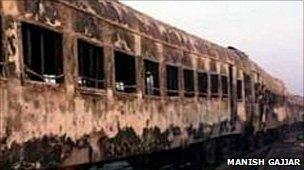Eleven sentenced to death for India Godhra train blaze
- Published

A total of 59 passengers died in the blaze
Eleven men have been sentenced to death for setting fire to a passenger train in the Indian town of Godhra in 2002, killing dozens of Hindu pilgrims.
Another 20 men were sentenced to life in prison. Last week, the court in Gujarat acquitted 63 of the accused.
The Sabarmati Express was attacked by a Muslim mob killing 59 people, mainly Hindu pilgrims.
The attack led to some of the worst riots seen in India, in which more than 1,000 people - mainly Muslims - died.
Gujarat's authorities were criticised for not doing enough to stop the riots.
All of those accused were Muslim. The convicted men have 90 days to appeal.
The attackers were said to have forced the train, carrying Hindu pilgrims returning from the northern town of Ayodhya, to stop, and then set fire to one of the carriages.
'Conspiracy'
Whether or not there was a conspiracy to set the train ablaze or whether it was a spontaneous fire has long been the subject of dispute.
An inquiry commission set up by the state government said in 2008 that the burning of the train was a "conspiracy".
That commission also exonerated Gujarat's Chief Minister Narendra Modi over the deadly religious riots that followed the blaze.
He was accused of failing to halt the violence and some opponents said he indirectly encouraged some of the Hindu rioters. But the commission dismissed these allegations.
However, Mr Modi was criticised in 2010 for his "partisan" stance by a separate Supreme Court panel which investigated the riots.
It said he showed "discriminatory attitude by not visiting riot-affected areas in Ahmedabad where a large number of Muslims were killed," according to Tehelka magazine and AFP news agency.
The inquiry commission's findings contradicted an earlier probe by retired Supreme Court judge Umesh Chandra Banerjee, who found that the coach fire was not deliberately started.
He concluded in 2005 that the fire began by accident.
He said there was evidence to suggest the blaze began inside the train and that it was not fire-bombed.
- Published22 February 2011
